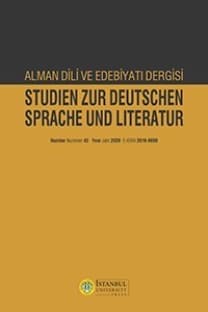“I am only me.” The ‘Crisis of the Subject’ in Feridun Zaimoglu’s Novel Isabel
Isabel, Feridun Zaimoglu, Subject, Crisis, Contemporary German literature
___
Aczel, R (2008). Subjekt und Subjektivität. In Ansgar Nünning (Hrsg.), Metzler Lexikon. Literatur- und Kulturtheorie. Ansätze – Personen – Grundbegriffe, vierte aktualisierte und erweiterte Auflage (S. 691-692). Stuttgart / Weimar: Verlag J. B. Metzler. Assmann, Aleida (2011). Einführung in die Kulturwissenschaft. Grundbegriffe, Themen, Fragestellungen, 3., neu bearbeitete Auflage. Berlin: Erich Schmidt. Blumentrath, H., Bodenburg, J., Hillman, R., Wagner-Egelhaaf, M. (2007). Transkulturalität. Türkisch-deutsche Konstellationen in Literatur und Film. Münster: Aschendorff. Brecht, B. (2010). Die Dreigroschenoper. Der Erstdruck 1928. Mit einem Kommentar von Joachim Lucchesi. Frankfurt a. M.: Suhrkamp. Butler, J. (2008). Haß spricht. Zur Politik des Performativen. (K. Menke, M. Krist, aus dem Englischen Übers.). Frankfurt a. M.: Suhrkamp. Döblin, A. (2003). Berlin Alexanderplatz. Die Geschichte von Franz Biberkopf. München: dtv. Duden Etymologie (1989). Herkunftswörterbuch der deutschen Sprache, 2., völlig neu bearbeitete und erweiterte Auflage von Günther Drosdowski. Duden Band 7. Mannheim u.a.: Dudenverlag. Eagleton, T. (2001). Was ist Kultur? Eine Einführung. (H. Fliessbach, aus dem Englischen Übers.). München: C.H. Beck. Eggert, L. (Oktober 2014). Ziel- und zeitlose Streifzüge durch Berlin. Feridun Zaimoglus „Isabel“ – ein kleines Monument für eine große Stadt. literaturkritik.de, Nr. 10, Oktober. Abgerufen von http://literaturkritik.de/id/19851 Frisch, M.(2004). Stiller. Frankfurt a. M.: Suhrkamp. Granzin, K. (10.09.2014). Feridun Zaimoglu „Isabel“. Die Ballade von Isabel. Der neue Roman von Feridun Zaimoglu feiert allein die Wucht des Augenblicks. Frankfurter Rundschau. Abgerufen von http://www.fr.de/kultur/literatur/feridun-zaimoglu-isabel-die-ballade-von-isabel-a-561761 Hall, S. (2012a). Die Frage der kulturellen Identität. In Stuart Hall, Rassismus und kulturelle Identität. Ausgewählte Schriften 2. (S. 180-222). Hamburg: Argument. Hall, Stuart (2012b). Alte und neue Identitäten, alte und neue Ethnizitäten. In Stuart Hall, Rassismus und kulturelle Identität. Ausgewählte Schriften 2. (S. 66-87). Hamburg: Argument. Herrmann, L., Horstkotte, S. (2016). Gegenwartsliteratur. Eine Einführung. Stuttgart: J. B. Metzler. Hofmannsthal, H. v. (1991). Ein Brief. In Hugo von Hofmannsthal, Sämtliche Werke. E. Ritter (Hrsg.), Bd. 31: Erfundene Gespräche und Briefe. Frankfurt a. M.: Fischer, S. 45-55. Jessen, J. (24.03.2014). Feridun Zaimoglu „Isabel“. Am Anfang war der Hass. Zeit Online. Abgerufen von http://www.zeit.de/2014/12/feridun-zaimoglu-isabel/komplettansicht Kara, Y. (2004). Selam Berlin. Zürich: Diogenes. Karakuş, M. (2010). Identitätssuche: Der Prozess oder das Ziel? Yade Karas Roman „Selam Berlin“. In: Yadigar Eğit (Hrsg.), XI. Türkischer Internationaler Germanistik Kongress 20-22. Mai 2009. Globalisierte Germanistik: Sprache – Literatur – Kultur. Tagungsbeiträge (S. 52-59). Izmir: Ege Üniversitesi Matbaası. Lacan, J. (1991). Das Spiegelstadium als Bildner der Ichfunktion wie sie uns in der psychoanalytischen Erfahrung erscheint. In Jacques Derrida, Das Werk. Schriften 1. N. Haas (ausgew. u. hrsg.), R. Gasché (Übers.), unter Mitwirkung von Chantal Creusot, (3. korrigierte Aufl.). Weinheim / Berlin: Quadriga, (S. 61-70). Uysal Ünalan, S. (2013). Interkulturelle Begegnungsräume. Neue Identitätskonstruktionen in der türkisch-deutschen Gegenwartsliteratur. Würzburg: Königshausen & Neumann. Villa, P.I. (2003). Judith Butler. Frankfurt a. M. / New York: Campus. Yeşilada, K. E. (1997). Die geschundene Suleika. Das Eigenbild der Türkin in der deutschsprachigen Literatur türkischer Autorinnen. In M. Howard (Hrsg.), Interkulturelle Konfigurationen. Zur deutschsprachigen Erzählliteratur von Autoren nichtdeutscher Herkunft (S. 95-114). München: Iudicium. Yildiz, Y. (2009). Turkish Girls, Allah’s Daughters, and the Contemporary German Subject: Itinerary of a Figure. German Life and Letters 62 (4), (S. 465-481). Yildiz, Y. (2012). Wordforce: Ethnicized Masculinity and Literary Style in Kanak Sprak and Koppstoff. Cheesman, T., & Yeşilada K. E. (Hrsg.), Feridun Zaimoglu (S. 71-91). Oxford u.a.: Peter Lang. Zaimoglu, F. (2006). Leyla. Köln: Kiepenheuer & Witsch. Zaimoglu, F. (2011). Kanak Sprak / Koppstoff. Die gesammelten Mißtöne vom Rande der Gesellschaft. Köln: Kiepenheuer & Witsch. Zaimoglu, F. (2014). Isabel. Köln: Kiepenheuer & Witsch. Zima, P. V. (2000). Theorie des Subjekts. Subjektivität und Identität zwischen Moderne und Postmoderne. Tübingen / Basel: Francke.- Başlangıç: 1954
- Yayıncı: İstanbul Üniversitesi
A Comparative Study of the Realms of Thinking by German Language Teachers Using Metaphors
Trains as Stages in Emine Sevgi Özdamar’s Novels
Political television interviews and communicative failures for journalists
Self-learning habits of German language teacher candidates
“I am only me.” The ‘Crisis of the Subject’ in Feridun Zaimoglu’s Novel Isabel
